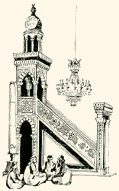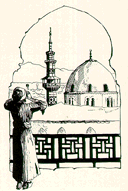The shift in power to Damascus, the Umayyad capital city, was to have profound effects on the development of Islamic history. For one thing, it was a tacit recognition of the end of an era. The first four caliphs had been without exception Companions of the Prophet - pious, sincere men who had lived no differently from their neighbors and who preserved the simple habits of their ancestors despite the massive influx of wealth from the conquered territories. Even 'Uthman, whose policies had such a divisive effect, was essentially dedicated more to the concerns of the next world than of this. With the shift to Damascus much was changed.
In the early days of Islam, the extension of Islamic rule had been based on an uncomplicated desire to spread the Word of God. Although the Muslims used force when they met resistance they did not compel their enemies to accept Islam. On the contrary, the Muslims permitted Christians and Jews to practice their own faith and numerous conversions to Islam were the result of exposure to a faith that was simple and inspiring.
 Photo: Medieval Muslims regarded the Great Mosque built by the Umayyads in Damascus as one of the wonders of the world.
Photo: Medieval Muslims regarded the Great Mosque built by the Umayyads in Damascus as one of the wonders of the world.
With the advent of the Umayyads, how ever, secular concerns and the problems inherent in the administration of what, by then, was a large empire began to dominate the attention of the caliphs, often at the expense of religious concerns - a development that disturbed many devout Muslims. This is not to say that religious values were ignored; on the contrary, they grew in strength for centuries. But they were not always at the forefront and from the time of Mu'awiyah the caliph's role as "Defender of the Faith" increasingly required him to devote attention to the purely secular concerns which dominate so much of every nation's history.
Muiawiyah was an able administrator, and even his critics concede that he possessed to a high degree the much-valued quality of hilm - a quality which may be defined as "civilized restraint" and which he himself once described in these words:
I apply not my sword where my lash suffices, nor my lash where my tongue is enough. And even if there be one hair binding me to my fellowmen, I do not let it break: when they pull I loosen, and if they loosen I pull.
Nevertheless, Mu'awiyah was never able to reconcile the opposition to his rule nor solve the conflict with the Shi'is. These problems were not unmanageable while Mu'awiyah was alive, but after he died in 680 the partisans of 'Ali resumed a complicated but persistent struggle that plagued the Umayyads at home for most of the next seventy years and in time spread into North Africa and Spain.
 Photo: Facing al-Gharbiyah, the western minaret, a muezzin at the Umayyad Mosque calls believers to prayer.
Photo: Facing al-Gharbiyah, the western minaret, a muezzin at the Umayyad Mosque calls believers to prayer.
The Umayyads, however, did manage to achieve a degree of stability, particularly after 'Abd al-Malik ibn Marwan succeeded to the caliphate in 685. Like the Umayyads who preceded him, 'Abd al-Malik was forced to devote a substantial part of his reign to political problems. But he also introduced much needed reforms. He directed the cleaning and reopening of the canals that irrigated the Tigris-Euphrates Valley - a key to the prosperity of Mesopotamia since the time of the Sumerians - introduced the use of the Indian water buffalo in the riverine marshes, and minted a standard coinage which replaced the Byzantine and Sassanid coins, until then the sole currencies in circulation. 'Abd al-Malik's organization of government agencies was also important; it established a model for the later elaborate bureaucracies of the 'Abbasids and their successor states. There were specific agencies charged with keeping pay records; others concerned themselves with the collection of taxes. 'Abd al-Malik established a system of postal routes to expedite his communications throughout the far flung empire. Most important of all, he introduced Arabic as the language of administration, replacing Greek and Pahlavi.
Under 'Abd al-Malik, the Umayyads expanded Islamic power still further. To the east they extended their influence into Transoxania, an area north of the Oxus River in today's Soviet Union, and went on to reach the borders of China. To the west, they took North Africa, in a continuation of the campaign led by 'Uqbah ibn Nafi' who founded the city of Kairouan - in what is now Tunisia - and from there rode all the way to the shores of the Atlantic Ocean.
These territorial acquisitions brought the Arabs into contact with previously unknown ethnic groups who embraced Islam and would later influence the course of Islamic history. The Berbers of North Africa, for example, who resisted Arab rule but willingly embraced Islam, later joined Musa ibn Nusayr and his general, Tariq ibn Ziyad, when they crossed the Strait of Gibraltar to Spain. The Berbers later also launched reform movements in North Africa which greatly influenced the Islamic civilization. In the East, Umayyad rule in Transoxania brought the Arabs into contact with the Turks who, like the Berbers, embraced Islam and, in the course of time, became its staunch defenders. Umayyad expansion also reached the ancient civilization of India, whose literature and science greatly enriched Islamic culture.
 Photo: The minaret of the Great Mosque at Kairouan in Tunisia became the prototype for the majority of North African minarets.
Photo: The minaret of the Great Mosque at Kairouan in Tunisia became the prototype for the majority of North African minarets.
In Europe, meanwhile, the Arabs had passed into Spain, defeated the Visigoths, and by 713 had reached Narbonne in France. In the next decades, raiding parties continually made forays into France and in 732 reached as far as the Loire Valley, only 170 miles from Paris. There, at the Battle of Tours, or Poitiers, the Arabs were finally turned back by Charles Martel.
One of the Umayyad caliphs who attained greatness was 'Umar ibn 'Abd al-'Aziz, a man very different from his predecessors. Although a member of the Umayyad family, 'Umar had been born and raised in Medina, where his early contact with devout men had given him a concern for spiritual as well as political values. The criticisms that religious men in Medina and elsewhere had voiced of Umayyad policy - particularly the pursuit of worldly goals - were not lost on 'Umar who, reversing the policy of his predecessors, discontinued the levy of a poll tax on converts.
This move reduced state income substantially, but as there was clear precedent in the practice of the great 'Umar ibn al-Khattab, the second caliph, and as 'Umar ibn 'Abd al-'Aziz was determined to bring government policy more in line with the practice of the Prophet, even enemies of his regime had nothing but praise for this pious man.
The last great Umayyad caliph was Hisham, the fourth son of 'Abd al-Malik to succeed to the caliphate. His reign was long - from 724 to 743 - and during it the Arab empire reached its greatest extent. But neither he nor the four caliphs who succeeded him were the statesmen the times demanded when, in 747, revolutionaries in Khorasan unfurled the black flag of rebellion that would bring the Umayyad Dynasty to an end.
Although the Umayyads favored their own region of Syria, their rule was not without accomplishments. Some of the most beautiful existing buildings in the Muslim world were constructed at their instigation - buildings such as the Umayyad Mosque in Damascus, the Dome of the Rock in Jerusalem, and the lovely country palaces in the deserts of Syria, Jordan, and Iraq. They also organized a bureaucracy able to cope with the complex problems of a vast and diverse empire, and made Arabic the language of government. The Umayyads, furthermore, encouraged such writers as 'Abd Allah ibn al-Muqaffa' and 'Abd al-Hamid ibn Yahya al-Katib, whose clear, expository Arabic prose has rarely been surpassed.
 Photo: The shrine of the Dome of the Rock in Jerusalem, built in an area revered by Muslims, Christians and Jews alike covers the rock from which Muhammad is believed to have ascended to heaven with the Angel Gabriel.
Photo: The shrine of the Dome of the Rock in Jerusalem, built in an area revered by Muslims, Christians and Jews alike covers the rock from which Muhammad is believed to have ascended to heaven with the Angel Gabriel.
For all that, the Umayyads, during the ninety years of their leadership, rarely shook off their empire's reputation as a mulk - that is, a worldly kingdom - and in the last years of the dynasty their opponents formed a secret organization devoted to pressing the claims to the caliphate put forward by a descendant of al-'Abbas ibn 'Abd al-Muttalib, an uncle of the Prophet. By skillful preparation, this organization rallied to its cause many mutually hostile groups in Khorasan and Iraq and proclaimed Abu al-'Abbas caliph. Marwan ibn Muhammad, the last Umayyad caliph, was defeated and the Syrians, still loyal to the Umayyads, were put to rout. Only one man of importance escaped the disaster - 'Abd al-Rahman ibn Mu'awiyah al-Dakhil, a young prince who with a loyal servant fled to Spain and in 756 set up an Umayyad Dynasty there.